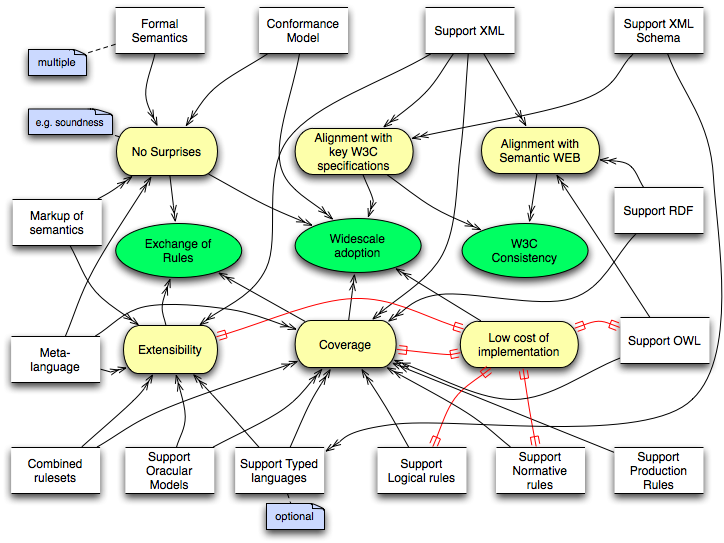A critical factors analysis (CFA) is an analysis of the key properties of a project (in this case the RIF). A CFA is analysed in terms of the goals of the project, the critical factors that will lead to its success and the measurable requirements of the project implementation that support the goals of the project. This methodology is further explained in the CFA Methodology.
The main goals, critical success factors and requirements of the Rules Interchange Format are illustrated below:
This diagram is not intended as a complete description; its primary benefit is to provide an easily assimilated visual map of the text itself.
1. Goals
The primary goal of the RIF is to be an effective means of exchanging rules that has the potential to be widely adopted in industry and that is consistent with existing W3C technologies and specifications.
2. Design Constraints that need more discussion
Note: these are now maintained at Document issues.
2.1. Critical success factors
- Efficient implementation is possible
- Comment: new CSF to be considered for the next Working Draft
- RIF should be usable as the basis for a Semantic Web rule language
- Comment: maybe a Goal
2.2. Requirements
- RIF representation of XML is XML (perhaps similar requirements for RDF and OWL)
- Phase 2
- RIF should support meta-data for currency of rules
- Comment: perhaps part of the requirement on meta-data support
- RIF should support meta-data indicating the executability of rules
- Comment: perhaps in the next versions of the WD
- RIF should support external calls (e.g. to query processors)
- RIF should permit SPARQL queries to be used in rules
- RIF should permit SQL queries to be used in rules
- RIF should accept UML instances as data
- Phase 2
- RIF should accept ORM Fact Model populations as data
- Phase 2
- RIF should support uncertain and probabilistic information
- Phase 2
- RIF must cover RDF.
- Phase 2
- RIF must cover OWL.
- Phase 2
